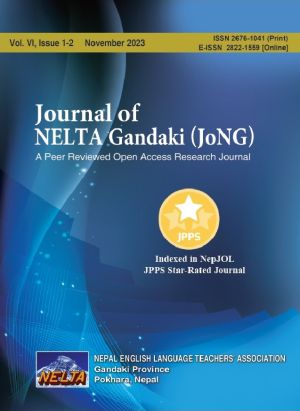Editorial Vol.6(1-2)
DOI:
https://doi.org/10.3126/jong.v6i1-2.59704Abstract
Teaching English as a Foreign Language (EFL) has a collaboration with various dimensions regarding language teaching, instructional pedagogy, classroom-based research activities and teachers' professional development (TPD). As a part of English language TPD to improve the quality of EFL and to contribute to knowledge creation, the publication of the Journal of NELTA Gandaki (JoNG) has a pivotal role in sharing pedagogical skills through academic writing among EFL teachers from home and abroad. In today's interconnected world, proficiency in English is a desirable and a requisite skill for personal and professional success. Like educators, researchers, and practitioners, we should equip learners with multidimensional knowledge of EFL in the diverse phenomena.
We are pleased to publish the sixth volume of JoNG, a star-rated NepJOL-indexed peer-reviewed research journal of NELTA Gandaki, covering articles from various facets of EFL pedagogy and research. From exploring innovative methodologies to enhance English language teaching (ELT) to examining the cultural and sociolinguistic dimensions of English education, we strive to cater to the varied interests of our readership. We encourage readers to engage with these articles, not only to gain new insights but also to contribute to the ongoing conversation by sharing their own experiences and expertise. Furthermore, we are committed to fostering inclusivity and diversity in the EFL community.
This issue includes ten articles from various fields of applied linguistics, ELT and testing, ICT in EFL classrooms, and classroom-based research. Of them, the first one explores the factors responsible for the trivialization of extensive reading in university reading instruction. The second article attempts to bridge the gap between traditional pedagogical approaches and modern educational requirements. Similarly, the third article investigates how model presentation, collaboration, discussion, and peer feedback as the intervention of participatory action research (PAR) improve students' academic writing (AW) and presentation skills while dealing with a practical course ‘ELT seminar and report writing’. Likewise, the fourth article sheds light on secondary-level students' experiences of using Facebook for communication and education.
The fifth article examines the students’ perceptions of assessment in the EFL context and explores the preparation strategies for the examination. Similarly, the sixth article explores how counter-discourse exposes illusion and creates awareness taking reference from the text ‘Politics of Fear’ by Al Gore. The seventh article presents a review of participatory action research papers highlighting their meaning, purpose and use in research. The eighth article explores the students’ experiences of cyberbullying through Facebook and the strategies they apply to cope with cyberbullying. The ninth article reveals the usefulness of building collaborative relationships through collaborative mentoring for teachers’ emotional and mental well-being. The final article highlights teachers' perceptions and challenges in using teacher training strategy as a professional development.
We expect that this volume will inspire and guide educators and researchers fostering a culture of research. We appreciate the authors, reviewers, and the entire NELTA family for their support and inspiration to publish this issue. JoNG will continue to serve as a platform for innovative ideas, best practices, and insightful research in the field of EFL.
The articles published in the journal are the properties of NELTA Gandaki Province. However, the authors bear the sole responsibility for the authenticity and liability of the opinions and knowledge expressed in them. We expect constructive feedback from valued readers and well-wishers to uplift the standard and quality of the journal in the forthcoming issues.
-Editors
Downloads
Downloads
Published
How to Cite
Issue
Section
License
Copyright (c) 2023 Nepal English Language Teachers' Association Gandaki Province

This work is licensed under a Creative Commons Attribution-NonCommercial 4.0 International License.
This license allows reusers to distribute, remix, adapt, and build upon the material in any medium or format for noncommercial purposes only, and only so long as attribution is given to the creator.




